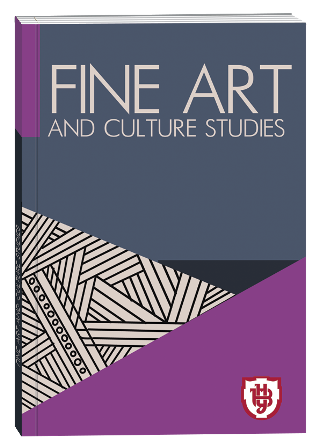DISTANT VOCAL FOR ACTORS: A COMBINATION OF TRADITIONAL AND INNOVATIVE APPROACH
DOI:
https://doi.org/10.32782/facs-2025-1-21Keywords:
remote vocal training, digital technologies in vocal education, vocal and technical parameters, acoustic analysis of voice, interactive platforms, register integration, timbre equilibrium, articulatory clarity, intonational stability, stage expressiveness, multimedia educational.Abstract
The article is devoted to the problem of remote vocal preparation of actors in the context of transformation of modern musical and pedagogical techniques and the introduction of digital technologies into vocal education. The purpose of the work is to analyze the effectiveness of integration of traditional vocal and pedagogical approaches with digital means that contribute to the improvement of vocal and technical and performing parameters of voice in remote format. The methodological apparatus of the study is based on a complex approach, which includes a comparative analysis of traditional and remote vocal techniques, structural and functional analysis of the impact of digital tools on the acoustic characteristics of vocal sound, as well as empirical observation of the effectiveness of distance learning based on practical results of actors. Scientific novelty is to determine the specificity of adaptation of traditional vocal techniques (singing, resonant exercises, articulatory training, the method of formation of vocal cantilever) to distance learning format, as well as in the study of the role of audiovisual technologies in providing high quality vocal training. In particular, the possibilities of spectral analysis of voice, the use of interactive platforms for the development of musical hearing, rhythmic coordination and stage expressiveness are considered. The prospects for the creation of multimedia educational platforms that synthesize solfeeding training, vocal and technical training, work with musical and dramatic text and stage improvisation are defined.The analysis of the results showed that distance learning, despite technical restrictions, promotes the development of students’ independence, stimulates their responsibility for the control of vocal and technical parameters and expands the possibility of working out various sources of musical information. Conservation of individual approach in distance education is possible through integration of digital technologies that provide a detailed acoustic analysis of voice and correction of timbral equilibrium, register integration, intonational accuracy and articulatory clarity. Thus, the synthesis of traditional vocal pedagogy and digital technologies in distance learning opens new prospects for optimizing the vocal educational process and ensuring the high level of performing skills of modern actors.
References
Антонюк В. Г. Вокальна педагогіка (сольний спів): підруч. Київ: ЗАТ «Віпол», 2007. 174 с.
Бєдакова С. В. Методика викладання сольного співу для дистанційного навчання та самостійної роботи (Частина 1): навчально-методичний посібник для студентів закладів вищої освіти спеціальності «музичне мистецтво». Миколаїв. 2023. 204 с.
Гребенюк Н. Є. Вокально-виконавська творчість: психолого-педагогічний та мистецтвознавчий аспекти : монографія. Київ : НМАУ ім. П. І. Чайковського, 1999. 269 с.
Даофен Сі. Методика використання інноваційних технологій у підготовці майбутніх учителів музики до співацької діяльності : дис. … канд. пед. наук : 13.00.02 / Національний педагогічний університет імені М.П.Драгоманова. Київ. 2015. 245 с.
Жишкович М. Основи вокально-педагогічних навиків : методичні поради. Львів, 2007. 43 с.
Набоков Р., Крипчук М. Дидактичне обґрунтування теоретичних і практичних компонентів викладання курсу «Режисура шоу та артпроєктів» в умовах екстреного дистанційного онлайн-навчання. Вісник Київського національного університету культури і мистецтв. Серія: Сценічне мистецтво, 2023, 6.1: 88–100.
Овчаренко Н. Сучасний стан вокальної підготовки майбутніх учителів музичного мистецтва в умовах дистанційного навчання. Засоби навчальної та науково‐ дослідної роботи. 2022. Вип. 58. С. 63–72.
Павлюк Н.М., Павлічук В.І., Міщенко З.О. Електронні ресурси як істркмент к навчальні постановки голосу. Інноваційна педагогіка. Випуск 56. Том 2. 2023. С. 96–100.
Смирна О. Ю., Гіголаєва-Юрченко В.О., Давидовчи Л.В. Основні аспекти формування вокальної компетентності здобувачів вищої освіти спеціальності 025 Музичне мистецтво в умовах дистанційного навчання. Академічні візії. (16). 2023. https://academy-vision.org/index.php/av/article/view/153
Тарусова О. В. Формування вокально-технічних навичок майбутніх співаків у процесі фахової підготовки : кваліфікаційна робота на здобуття освітнього ступеню магістра / Сумський державний педагогічний університет імені А. С. Макаренка. Суми, 2020. 73 с.







